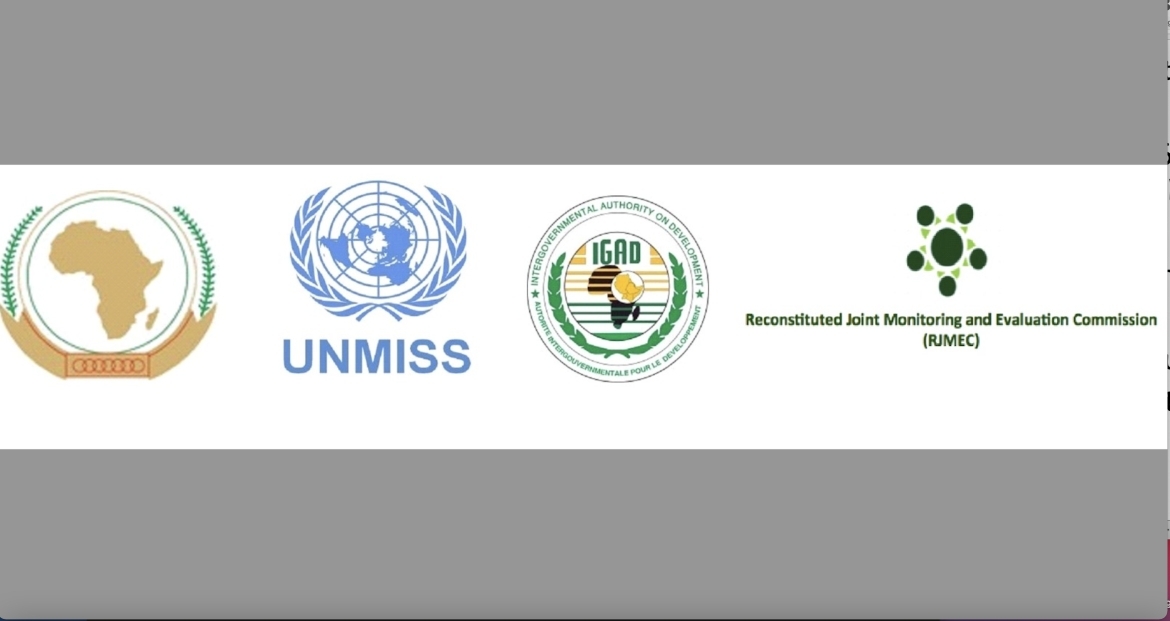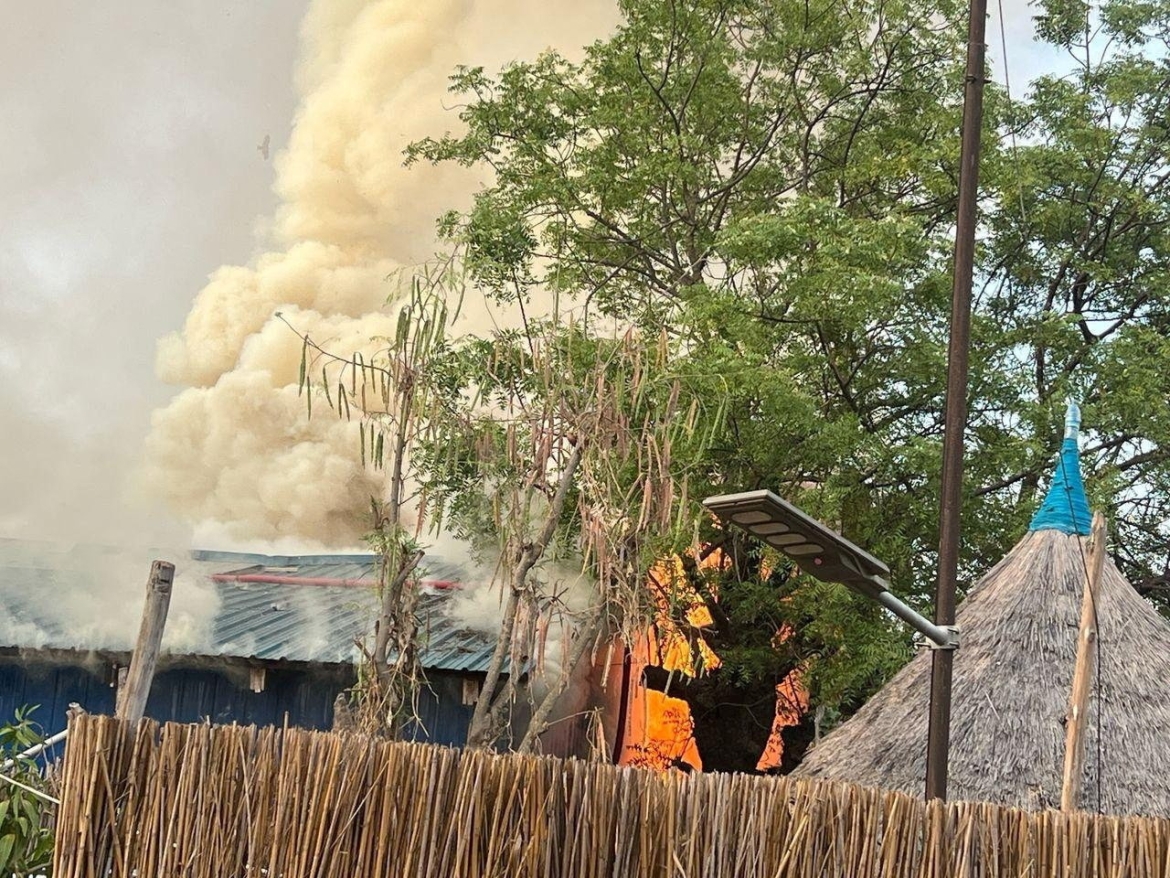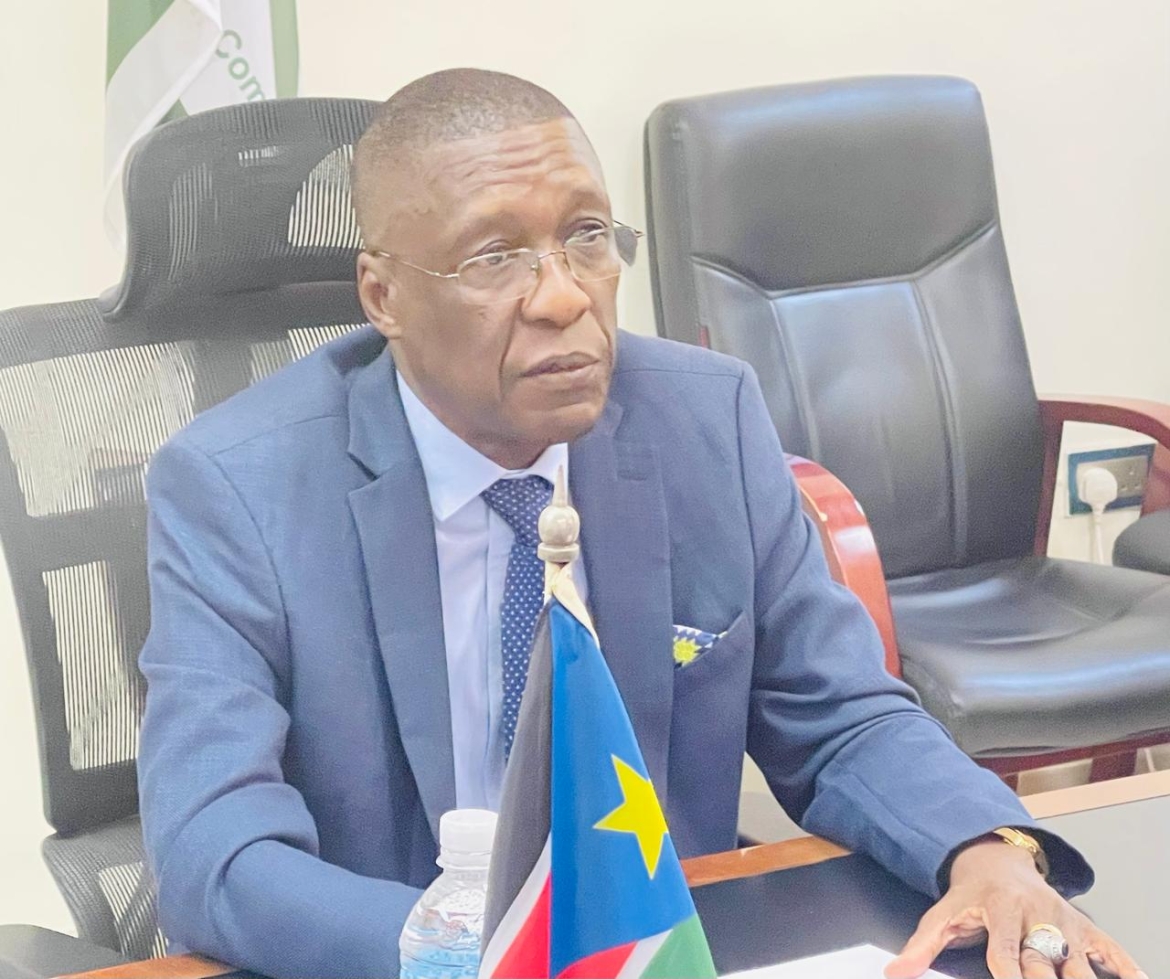JMCC holds its 52nd meeting in Juba
The Joint Military Ceasefire Commission (JMCC) has on Wednesday held it 52nd meeting in Juba.
The meeting was chaired by Major General Majier Deng.
JMEC: Civil Society voice critical for the realisation of peace in South Sudan
COMMUNICATIONS OFFICE
PRESS RELEASE
(For Immediate Publication)
01 June, 2017, Juba, South Sudan
JMEC: Civil Society voice critical for the realisation of peace in South Sudan
The role of the civil society organisations in the oversight and implementation of the Peace Agreement of South Sudan is critical, the Deputy Chairperson of the Joint Monitoring and Evaluation Commission Amb. Gen Augostino Njoroge has said.
“As Civil Society, you are the bridge in your society. You are that public space between the state, the market and the ordinary households in which people can constructively debate and tackle all issues of public concern,” he said.
The Agreement on the Resolution of the Conflict in the Republic of South Sudan (ARCSS) the chairperson said, is the “foundation stone upon which sustainable peace can be built in this country”.
He was speaking yesterday during the closing ceremony of a two-day civil society orientation and advocacy-training workshop on the ARCSS organised for civil society representatives to the different Agreement institutions and mechanisms.
The workshop was organised in partnership with the United Nations Development Programme (UNDP).
“A vibrant and constructive civil society voice is critical for the realisation of peace, promotion of good governance, democratisation and the rule of law everywhere in the world,” Amb. Njoroge said.
Participants included over 30 CSO members representing Women Bloc, Youth, CSOs and Faith based groups in JMEC, Strategic Defence and Security Review (SDSR) board, Ceasefire and Transitional Security Arrangements Monitoring Mechanism (CTSAMM) and others.
Amb. Njoroge said the sector players should vigorously agitate for a peaceful resolution of the conflict and be agents for national dialogue.
“The civil society must collectively and continuously be the social capital and a force for the good. The civil society must rally on a common goal, set better standards, and rise above all social, political and economic vices like tribalism, partisanship and corruption-to mention but a few,” he said.
ENDS
STATEMENT BY AMBASSADOR BERHANU KEBEDE- CHIEF OF STAFF OF THE JOINT MONITORING & EVALUATION COMMISSION TO THE IGAD COUNCIL OF MINISTERS ON MARCH 26TH 2018 ADDIS ABABA, ETHIOPIA
Chairperson of IGAD Council of Ministers, Chairperson of the Africa Union Commission, IGAD Special Envoy for South Sudan, Honourable Ministers,
Your Excellencies, Distinguished Participants, Ladies and Gentlemen.
1. Good morning. I thank you for your kind invitation for JMEC to brief you here today. I convey the greetings and best wishes from H.E. Festus Mogae, Chairperson of JMEC, who sadly cannot be here with us in person. I am honoured to deliver this statement on his behalf.
2. I would like to begin by welcoming the renewal of the mandate of United Nation Mission in South Sudan (UNMISS) by the UN Security Council. UN Security Council Resolution 2406 mandates support for the implementation of the peace agreement and the ongoing High Level Revitalization Forum. The full deployment and execution of the mandate of the Regional Protection Force (RPF) remains an important component of ensuring a conducive environment for the implementation of the peace agreement and for the process going forward.
Chairperson, Ministers, Excellencies, Ladies and Gentlemen,
3. Two months ago JMEC addressed the Council and commended both you and Ambassador Ismail Wais, the IGAD Special Envoy for South Sudan, together with the high level facilitators, for the successful conclusion of the first phase of the High-Level Revitalization Forum that culminated in a signed Agreement on Cessation of Hostilities, Protection of Civilians and Humanitarian Access in December 2017.
4. JMEC was all hopeful then that a cessation of hostilities would provide a peaceful environment within which all the Parties could constructively engage in the revitalization process, ensure the protection of civilians and facilitate unimpeded humanitarian access in the Republic of South Sudan for the duration of the Forum and thereafter.
5. Unfortunately, the CoHA has been violated repeatedly since the parties signed on to it in December 2017. There must be consequences for non-compliance and JMEC urges IGAD to take concrete action against violators.
6. JMEC commends you for steering the second phase of the Forum conducted last month. JMEC has been briefed on the progress made, including agreement reached on specific articles of Chapters I and II of the 2015 Peace Agreement as well as on the divergent views on issues that the Parties are yet to reach agreement. The Special Envoy will no doubt be providing a comprehensive report on the conduct of and progress made. JMEC will continue to render its support to the Special Envoy in accordance with the terms mandated by IGAD.
7. The HLRF presents a lifeline that the parties must seize with seriousness in order to set South Sudan on a path for sustainable peace. JMEC has said before, and we repeat it now, that the revitalisation process provides the most effective platform upon which to confront and resolve the severe security, governance, economic and humanitarian crises that continue to overwhelm South Sudan.
Chairperson, Ministers, Excellencies, Ladies and Gentlemen,
8. JMEC has no doubt that the parties can reach agreement on all outstanding issues, if only they put the interest of South Sudan first. All parties must appreciate that time is of the essence. The fighting must stop. The suffering of the displaced must be brought to an end. Refugees must return to their homes.
9. The mandate of the HLRF is wide enough and sufficient enough to accommodate any proposal deemed pertinent for full and inclusive implementation. There is no doubt that for the ARCSS to be fully inclusive and effectively revitalized and implemented, there must be serious adjustments in some areas and a restructuring of all its mechanisms taking into account past and present realities.
10. Finally, JMEC recommends that, in terms of the way forward and securing a revitalised Agreement:
a. It is necessary for all Parties to a make a clear demonstration of commitment to peace and stop all forms of violence;
b. the status quo is not sustainable, and parties must explore concrete measures to revitalize the ARCSS, learn from experience and address current realities on the ground;
c. it is critical that IGAD, at its highest level, actively and collectively engages with the leadership of all parties and prevail upon those who pursue hardline positions to compromise and narrow the gaps between the various positions that currently exist.
d. Finally, the continued support of the region, international community and partners remains critical for success.
Thank you.
OPENING REMARKS BY JMEC CHIEF OF STAFF AT THE UPDATE OF THE HLRF PROCESS WORKSHOP, THEMED: “WOMEN TOGETHER FOR SUSTAINABLE PEACE" 21st MARCH 2018
TGoNU Representative
Mr Lansana Wonneh, The Deputy Country Representative of UN WOMEN-South Sudan
Ms. Amer Deng- the Representative of Women’s Bloc of South Sudan,
Distinguished guests,
Ladies and Gentlemen;
Good morning!
Let me start by thanking UN Women and Women’s Bloc of South Sudan for partnering with JMEC in convening this very important workshop on the The High Level Revitalization Forum on the Agreement on the Resolution of the Conflict Resolution in South Sudan. Information about the content and procedures of the process is key to enabling women’s effective participation.
I would like to congratulate IGAD and the Special Envoy for South South, Dr.Ismail Wais for ensuring that women were consulted in the pre forum stage of the HLRF process and for the increased number of accredited women and civil society delegates. This is in keeping with South Sudan’s gender policies as well as regional and international standards on gender inclusion in peace processes. JMEC remains committed to promoting women’s participation in peace-building and conflict resolution processes and joins UN Women and Women’s Organizations across South Sudan in pressing for progress in this effort and in our monitoring mandate.
As you are aware, the High Level Revitalization Forum commenced in Addis Ababa in December 2017. During the first phase of the Forum, the parties committed themselves to end the fighting. Consequently, all parties signed an Agreement on the Cessation of Hostilities, Protection of Civilians and Humanitarian Access (CoHA), signed on 21st December 2017. This was an important first step in laying the foundation for revitalisation of the Peace Agreement.
The Women’s Bloc and representatives of Civil Society provided a critical voice during the negotiations on the CoHA and therefore must devise ways of remaining engaged to monitor its implementation. I am informed that part of your deliberations at this workshop will focus on the Cessation of Hostilities Agreement and its implementation.
It is my hope, and that of JMEC’s that this workshop will not only equip you with the information you need but also help strengthen your role in contributing to the HLRF’s intended outcome of a revitalized Peace Agreement as well as robust and effective implementation with the ultimate goal of sustainable peace fro South Sudan.
I wish you fruitful deliberations.
Thank you very much.
Lack of accountability undermines ceasefire implementation, say S. Sudan women
Lack of accountability measures undermine the effective implementation of the ceasefire Agreement, women organizations representatives in South Sudan have said.
JMEC Chief of Staff, Amb. Berhanu Kebede during the opening of South Sudan women HLRF, ACoH orientation workshop on Wed March 21, 2018
We remain committed to promote women’s participation in peace building, conflict resolution, says JMEC Chief of Staff
JMEC Chief of Staff: “We remain committed to promoting women’s participation in peace-building and conflict resolution processes”
Communication Office
PRESS RELEASE
(For Immediate Publication)
Wednesday, March 21, 2018, Juba, South Sudan
JMEC Chief of Staff: “We remain committed to promoting women’s participation in peace-building and conflict resolution processes”
The Joint Monitoring and Evaluation Commission (JMEC) is committed to supporting the prominent role women play in peace building and conflict resolution in South Sudan, Chief of Staff, Amb. Berhanu Kebede has said.
Speaking during a workshop organized by the Women Bloc of South Sudan and supported by JMEC and UN Women in Juba on Wednesday, Amb. Kebede said,
“Keeping in line with South Sudan’s gender policies as well as regional and international standards on gender inclusion in peace processes, JMEC remains committed to promoting women’s participation in peace-building and conflict resolution processes and joins Women organizations across South Sudan in pressing for progress in this effort in our monitoring mandate.”
The three-day conference themed “Women together for Sustainable Peace” was aimed at creating awareness among representatives of women groups in the country on the first and second phase of the IGAD-led High Level Revitalization Forum (HLRF) process. In addition to the presentations on the Agreement on the Cessation of Hostilities (ACoH), it also sought to engage the participants on the role that the women can play to effectively contribute to the peace process in the country.
“Information about the content and procedures of the processes is key to enabling women’s effective participation,” he said.
Amb. Kebede thanked the regional body, IGAD and its Special Envoy for South Sudan, Dr.Ismail Wais “for ensuring that women were consulted in the pre-forum stage of the HLRF process and for the increased number of accredited women and civil society delegates.”
During the first phase of the HLRF that opened in December last year, Amb. Kebede said, the parties committed themselves to end the fighting, after they signed the ceasefire Agreement.
“This was an important first step in laying the foundation for revitalization of the Peace Agreement,” he said.
“It is my hope, and that of JMEC’s that this workshop will not only equip you with the information you need but also help strengthen your role in contributing to the HLRF’s intended outcomes.”
ENDS
JMEC supports women workshop on revitalization forum, ceasefire Agreement
The Joint Monitoring and Evaluation Commission in partnership with the South Sudan Women Bloc and the UN Women will from Wednesday (March 21) conduct a three-day Ceasefire Agreement workshop for representatives of women organizations in South Sudan.
Lack of resources hamper cantonment of troops, say JMCC Chairpersons
Lack of financial and logistical support continues to hamper the implementation of the cantonment of troops as envisaged by the South Sudan peace Agreement, the chairpersons of the Joint Military Ceasefire Commission (JMCC) have said.
Ambassador General Makur was a “patriot, champion of peace”, says JMEC
The Joint Monitoring and Evaluation Commission (JMEC) said it has received the demise of Ambassador General Andrew Makur Thou “with utter shock and deep sorrow”.
JMEC mourns the demise of Ambassador General Andrew Makur Thou
Communication Office
PRESS RELEASE
(For Immediate Publication)
Wednesday, March 14th, 2018, Juba, South Sudan
JMEC mourns the demise of Ambassador General Andrew Makur Thou
It is with utter shock and deep sorrow that the Joint Monitoring and Evaluation Commission (JMEC) has learnt of the demise of Ambassador General Andrew Makur Thou.
Until his passing on Tuesday in Khartoum, Ambassador General Makur was a Member of JMEC, and the Chairperson of the JMEC Security Working Committee.
Ambassador General Makur was a patriot, a champion of peace and indeed a key pillar in the 2015 Peace Agreement on the Resolution of the Conflict in South Sudan (ARCSS), where he was a participant in the signing of the Agreement as an Eminent Personality.
His sober and honest contributions to the Commission and to the entire South Sudan Peace process will undoubtedly be missed.
During this difficult time of mourning, the JMEC Chairperson, H.E Festus Mogae, Deputy Chairperson Ambassador Lt. Gen. Augostino Njoroge and the entire JMEC fraternity wish to send heartfelt condolences to the family, relatives and friends of Ambassador General Makur.
May the Almighty God give his family the strength to bear the loss and the wisdom to understand His will.
May the Almighty God rest his soul in everlasting peace.
ENDS





